Edition 36 editorial
Harpenden Free School is changing its name to Harpenden Academy. As a paper that started life with the moniker Academies Week, we empathise.
It’s not that free schools are bad. Or good. They are just schools, like any other. But the political associations of free schools with Michael Gove, free market zealotry, and a few unfortunate schools that had to close fairly rapidly, means the name is dropping out of favour.
It is also unsurprising that the chair of governors is trying to find reasons for it: blaming Ofsted and DfE for (non-existent) policy changes. Far easier than admitting that you just picked a daft name. (Which is what we eventually did).
Harpenden is however retaining the academy tag. And, as the Education Bill storms its way through Parliament, we can expect that more and more schools will likely capitulate to academy status. Do, and you might be saved the embarrassment of being forced to convert. Don’t, and the statistics look like they will catch up to you eventually.
What people shouldn’t lose sight of, though, is that all schools are just schools. Whether academy, special needs, free (or not), their unified purpose is giving young people the skills and knowledge they need to succeed in the future.
That’s why we named ourselves Schools Week in the end and why we wish Harpenden would decide to simply call itself Harpenden School, too. School is a title that never goes out of fashion.
Edition 35 editorial
The feeling of waking to glorious sunshine is soon destroyed when you turn the radio on and hear the Secretary of State for Education describe how schools in poorer areas are about to be whacked over the head.
Of course, that’s not what she actually said on Tuesday – but it is what the new ‘coasting schools’ legislation will do.
The narrative in ministerial speeches is that the Education Bill chugging its way through Parliament will bring social justice, ‘one nation’, and other meaningless guff.
In reality, analysis by Education Datalab shows that schools in wealthy areas will hardly be touched, and almost every grammar school will be protected.
But the story of St Anthony’s – the independent school that charged £4,000 a year yet was rated inadequate since changing to be a free school – shows that a school can be so pleasant that parents are happy to pay for it, yet might nevertheless be underachieving.
That such schools are unlikely to be found by the new legislation makes it a missed opportunity and an extraordinary waste of parliamentary time.
There are things to be looking at, not least a developing teacher shortage. But instead we are wasting time defining into existence a school type that on the evidence presented so far won’t achieve very much.
Thank goodness for the sunshine. The week might have been very dark without it.
Edition 34 editorial
It seems extraordinary that in a week when the chief Ofsted inspector describes acute teacher shortages in the most deprived parts of the country, at the same time some teachers are bartering access to their job in order to secure an internship for their son or daughter in a law firm or telly studio.
An upcoming teacher shortage is on the lips of every school practitioner I meet.
Governors are antsy that they can’t find headteachers. Heads are worried they can’t fill vacancies. And the crowds of PGCE students who normally float around the system, mopping up leftover jobs at this time of year, are already vanished.
As a poignant letter from a school leader explains on page 17, they desperately need good teachers to help their school improve – but so far none can be found.
This is one of the reasons why Labour are pushing so hard on the Education Bill, as explained in detail on page 8 and 9. The Conservative’s only plan for school improvement appears to be converting schools to academy status. But this doesn’t magic teachers into the areas where
they are needed. And it doesn’t explain what will happen to the 133 academies already labelled as inadequate. (The education bill only targets maintained schools).
Still, never fear. If you happen to work in a school in Woking, or a prep school in Carshalton, your recruitment prayers might be answered.
As the cover story this week reveals: teachers are advertising internships in their own school, in return for their own offspring getting an internship elsewhere.
It sounds like a daft idea. First because if there is one thing that young people have already experienced, it is school. And second because most university graduates already have access to school experiences via volunter-led projects such as Debatemate or The Brilliant Club.
But as times get lean in schools, and a growing number of schools advertise for ‘graduate assistants’ (who bring the enthusiasms of youth for the cost of a dinner assistant) it is also worth keeping eyes peeled for an increase in school ‘internship’ roles. Cheap labour may prove difficult for schools to resist.
Edition 33 editorial
No one is ever happy about an inspection. In airports, bag inspections reveal your underwear to strangers; a doctor’s inspection means prodding, usually right on the spot where it hurts.
But school inspectorate Ofsted’s reforms, as announced on Monday and described across these pages, have clearly been designed to make the prodding and revealing process more positive.
While letters to tell heads how great they are sound a little patronising – especially for professionals who are usually the merit badge givers – the move towards presuming schools are doing the right thing is a welcome shift, as is a more independent complaints process.
It was disappointing, though, to hear that Ofsted’s trumpeted ‘reliability tests’ have so far only been limited to six schools, and only check methodology rather than inspector judgments. Given the rigour of scrutiny schools increasingly find themselves under this seems lacklustre.
It is heartening to hear that reliability testing will continue and will extend into secondary schools. Let’s hope the roughly-once-a-month pace picks up too.
At the same time as Ofsted is dialing down the negative rhetoric, the Secretary of State seems to be picking it up. It has long been the plan to make the reformed GCSEs ‘harder’ and commentators, such as Conservative MP Graham Stuart, pointed out at the time that this could mean more pupils failing to pass their GCSEs – which impacts on their ability to access further education.
What we didn’t know until this week was the extent to which this would occur. But our analysis, using the 2014 GCSE figures, suggests that up to one in five pupils who passed their GCSE Maths last year would ‘fail’ it under the new system. That’s a lot.
Nicky Morgan already thinks too few pupils study maths to A level. If fewer pass their maths GCSE, this number is only going to drop.
Exams, like inspections, are never pleasant. But there’s no need to hold the painful spot for any longer than necessary. The government could learn a lesson from Ofsted. On this one.
Edition 32 editorial
When the government says they are going to make some subjects compulsory to 16, the schools sector can be forgiven for ignoring any promises that it will be done while listening to leaders and teachers, and with a long lead-in time. Not least because the people making those promises are the same stripe as those who said, just a few years ago, that the English baccalaureate subjects would not be made mandatory.
But does the change matter to secondary schools? On the one hand, it doesn’t. Fewer than 70 schools don’t currently offer all the EBacc subjects. At the other extreme, only two schools enter every pupil for the EBacc. Why? Maybe because it is difficult to employ enough language or humanities teachers to cover whole year groups. Maybe because students preferred other subjects, maybe the school thought other subjects more important for their pupils.
Schools Week recently revealed that one in three University Technical Colleges (UTC) do not offer all the EBacc subjects. Several UTC principals reasonably argued that their purpose was a focus on vocational education – so why would they teach the same academic subjects as school? It’s a fair question.
A long lead-in time sounds helpful if it means school get answers to thorny implementation problems. But it comes with a catch. While the government sits around ‘listening’ and figuring out what it wants, schools must still recruit new teachers, plan timetables, buy texts. These decisions become tougher when leaders don’t know what random exam policy the government will implement next.
What do you do if your music teacher is leaving? Replace them, or hedge your bets and advertise for a geography teacher with a side-interest in string instruments?
That sounds glib, but it is the reality schools work within. Hence, while ignoring policy churn is ideal, it’s also impossible.
We therefore look forward to the government outlining their detailed plans “in due course” and hope they don’t make this period of uncertainty stretch on too long.
Edition 31 editorial
So now we know that a ‘coasting school’ will be one that meets a definition decided by the Secretary of State, and any school rated inadequate will be changed into an academy as fast as its governing body can carry it. (And woe betide those who refuse).
This would be enormously exciting if it weren’t for an enormous glitch.
Simply put: academies aren’t necessarily better schools than ones looked after by local authorities. In fact, the 28 schools that plummeted down the Ofsted grading list after they drunk the academy Kool-Aid are inconvenient proof that a school might even do worse if academised.
That education secretary Nicky Morgan either didn’t know or was afraid to admit the number of academies currently rated as inadequate is worrying.
Facts matter, so we went away and answered the question ourselves. At present, 133 academies are rated as inadequate – and some since as long ago as 2013.
Why are the government allowing these failing academies to stick with their leaders? Maybe because stability is sometimes best. The Education Select Committee found in its nine month inquiry that schools not taken over by sponsors improve at about the same rate as those who are taken over.
The question also remains of what will happen when all schools have been converted and yet some still show up as below-average on our government’s data screens?
One can imagine politicians sitting around having exciting conversations about what might actually help. Better training? More resource? Maybe better access to psychological services?
And as they do crowds of teachers will gather outside and ask, impatiently, why they weren’t asking these questions many years ago rather than fiddling about with academy status.
It would be good if we could skip to the end, now.
Edition 30 editorial
Forced academy conversions of failing schools are to be speeded up under new legislation that will remove the need for consultations and reduce legal negotiations, Nicky Morgan exclusively revealed to Schools Week on Monday.
The newly-returned education secretary said during a webinar with editor Laura McInerney that she did not want failing school takeovers delayed because people “deliberately put hurdles in the way”.
“Becoming an academy can take 13 months – that’s longer than a whole academic year – when people are so focused on the legal agreements and crossing the T’s and dotting I’s that we’re losing the whole point of it, which is the education of young people and all of us wanting to improve that.”
Site issues, consultations, legal negotiations and discussions about funding agreements were all described as example hurdles that an upcoming education bill would seek to clear away.
Ms Morgan also said that “coasting” schools would face a series of interventions if they could not provide a credible school improvement plan.
In contrast to media reports over the weekend, Ms Morgan said that coasting schools were not those in the “requires improvement” Ofsted category. The label covers any school in which pupils are not making adequate progress, given their prior achievement.
“Some of those schools will be in the ‘requires improvement’ Ofsted category – but not all of them,” she said.
Where schools were identified as failing or coasting, regional school commissioners would speak with school leaders, teachers and governors, and assess whether the school had a credible plan and the capacity to improve.
This signals an increase in the powers of commissioners who at present can only scrutinise the performance of academies.
Schools Week revealed last year that the commissioners were performance-managed based on the percentage of eligible schools they converted to academy status and the number of schools in their region rated as inadequate.
Ms Morgan sought to assure webinar listeners that the process would nevertheless be undertaken in an open way.
“We are going to consult before passing the bill through parliament, but the vision is that … we have these eight regional school commissioners around the country, they are all former practitioners or have been working in education for a long time and they will make the process work.
“They will be very open about what’s going to happen to a school.”
In a softening of recent messages of “super head hit squads” going into failing schools, Ms Morgan said that headteachers in “coasting” schools would be offered additional support from national leaders of education. Another 400 would be appointed this year.
Edition twenty nine editorial
“No one congratulates the captain who steers his ship around the storm rather than through it.”
For several years in schools, this saying was apt. Reform upon reform, and Michael Gove’s persistent characterisation of a sector in the grip of “the blob”, made school leaders feel like they were in a storm whipped up for effect.
The reappointment of Nicky Morgan, a calmer force over the past year, and her entire ministerial team, makes it seem as if “steady goes the ship” might now be a more appropriate naval metaphor.
To think this, however, is to underestimate Ms Morgan and her party’s ambition.
The manifesto pledges are worth a re-read in the surprising light of a wholly-Conservative government.
The promises are strong on academisation, free schools, more testing, and on more “rigour” – or, at least, academic subjects being given first preference.
It is, as I said in an online piece last Friday morning, like Gove’s plans – but on speed.
Many in the teacher community will treat this with sadness. If “shy Tories” are a real thing, Tory teachers may be the shyest of all. Trying to find some to comment on stories is so difficult it can make you believe there aren’t any.
But whether they exist or not, the public has spoken. The Conservatives have a clear mandate for their reforms – with Nicky Morgan particularly liked among her constituents – and while implementation should be watched closely, it would be demeaning to the public’s preference to dismiss Conservative plans off-the-bat.
In England democracy means the winner takes all. The school community need to brace themselves for that.
Edition twenty eight editorial
Election days are weird for schools. If you’re closed for the day, you sit at home a bit out of sorts, thinking that the shops must inevitably be on bank holiday opening hours. If you’re in school with a polling station you spend the whole day shushing children and praying that it doesn’t rain so you can eat butties on the playground (given that the hall is out of order). And if, like most secondary teachers, you’re in school and the children are allowed to speak, you’ll spend the day being relentlessly asked about your voting intentions as you dance around the issue to avoid arcane penalties that you’re sure are laid down in some circular or other about opinions that teachers can or cannot have about such things.
All that’s already enough, and then there’s the problem of the night time. Do you stay up and watch, knowing that you must marshall year 3’s Friday afternoon PE session which is bad enough even when you’re not sleep-deprived, or do you do the sensible thing and miss out on a little piece of history the story of which might just be perfect for next week’s assembly?
On top of all that there’s the aching wait to find out who will be the next education secretary. “Just as long as it’s not Gove,” said more head teachers than I cared to count at NAHT’s annual conference last weekend. Yet others have said they miss his passion and they fear education will be overlooked in the next government.
In some respects, a hands-off politician might not be a bad thing. With a looming teacher shortage, tightening school budgets, and the GCSE, A level and curriculum reforms still to bed in, whoever is the next secretary of state is going to need more than passion. An iron stomach and a steady hand is definitely preferred.
Still, whoever the newbie is, and whatever their style, the brilliant thing about young people is that they will carry on as they were – learning, growing, improving. Education secretaries can change laws and budgets but despite decades of meddling they’ve yet to stop young people’s growth. There’s a lesson in that for us all.
Edition twenty seven editorial
In 1993, Ken Loach won a Cannes award for the film Raining Stones in which a father clamours to raise the cash for his daughter’s first communion dress. He steals sheep; he takes a handout from his elder daughter’s wages and then weeps with embarrassment; he never gets up because he wants his daughter to have the best.
The film is 22 years old, but still as relevant now as then.
Teachers know that parents who want the best for their children are worth their weight in gold. Hence, at no time do you worry for the little girl in Raining Stones.
But you do have to wonder whether it wasn’t possible for someone else in the community to step in and avoid his shame and what fast becomes his criminal activities.
As the NAHT family survey so provocatively shows today, that someone else is often the local school.
Rare is the teacher who can turn their eyes from the child struggling without a lunch or whose shirt neck is thickened with dirt.
Stories of children missing school because they are sharing a pair of trousers, or their clothes couldn’t be dried in a damp home devoid of heating, sound Dickensian but are a reality in many parts of the country. The survey suggests that this is only getting worse.
The upside is that schools have, so far, stemmed the problem. But with financial pressures on schools growing at the same time as their budgets are shrinking the likelihood is that they won’t be able to do so forever.
Edition twenty six editorial
While the election campaign rages on, schools are mostly getting back to business after the Easter break. Exam deadlines loom, as do summer fetes, school trips and summer plays.
For some school leaders, decisions must be made now that affect their school’s future.
Take Furness Academy, featured on the cover, and currently in the process of transferring to the sponsorship of BAE. The school has struggled for a long time. BAE is offering strategic support and a fresh start. It is a business embedded within the community. On the other hand, it creates objects that are instruments of war. Which aspect wins out? Which ought to?
In Telford, four schools are being transferred from one sponsor to another, while AET – the largest academy chain in England – has shed eight schools.
Each process of change involves nervous questions: Must we rename the school? What about the uniforms? Will all staff keep their jobs?
This emerging ‘transfer market’ in schools is both exciting and deeply challenging. Exciting because it gives poorly performing schools a shot at future success. Challenging because questions will always arise about the ‘appropriateness’ of sponsors and their plans.
The election is indeed important but these future-changing decisions are crucial too, that’s why we will keep covering them along with the campaign highlights, too.
Edition twenty five editorial
In the next few weeks, the public will turn their attention to what the political parties are offering for the future. The school community will prick its ears with regards to the changes it can expect to endure.
So far, the picture is one of continuity in education with added austerity. Unlike previous years, schools are not being singled out for extra funds. There will be no new premiums or fancy buildings. Protected funding is the best offer.
More pressing than future glittering prizes, however, are the ongoing implementation issues of exam reform.
Ofqual, the exam regulator, are working hard to achieve a smooth transition to the new ‘more rigorous’ GCSEs and A levels. But they cannot control the knock-on impacts, one of which is highlighted by Cambridge’s active consideration of a universal entrance exam.
It is quite extraordinary that a top university is so concerned about the reliability of GCSEs that its own tests might be necessary.
There’s also a serious question about access. One teacher responsible for sixth formers noted the stark difference between her pupils those from private schools. “I can’t see that it will be a step forward for access and diversity,” she wrote.
On the other hand, a senior lecturer at Cambridge said that he felt a common entrance exam would remove some bias from an admissions process otherwise reliant on personal statements and predicted grades.
Having spent time speaking with many admissions tutors at both Oxford and Cambridge, there is no doubt every admittance decision is sweated and changes will not be entered into lightly. Let’s hope a solution to suit everyone can be found.
Edition twenty four editorial
School leaders and teachers have spent the last few years panicking about Ofsted’s desires. Endless hours have been spent worrying about planning and marking requirements.
But now, even if Ofsted don’t pick on these issues, our cover story shows that a regional school commissioner (RSC) might.
Academies are supposed to be autonomous. Free to run how they wish as long as outcomes are good enough.
RSCs were brought in to oversee them: to check their performance, remove leaders if necessary, and pick new sponsors for struggling schools.
But the creeping use of shadowy ‘education advisors’ and strong-armed suggestions about teaching practice seem to over step this plan. Autonomy is starting to look like an ever-dimnishing pipe dream.
Plus, as Mary Bousted asks in the piece, how does a school appeal to the RSC? How do we know what training the advisors have completed?
RSCs should be a force for good. Our Blackpool Challenge story on page two is a good example. But the lack of clarity about their role needs resolving.
As the public face of the academy policy now is the time for the RSCs to step up and explain what schools can really expect going forwards.
Edition twenty three editorial
Douglas Adams once created a computer game called ‘Bureaucracy’. In it, you move house and so begin a tedious process of form-filling and waiting in for delivery men who constantly misread your address and fail to return your calls. A meter continuously checks your blood pressure and warns when nearing aneurysm level.
Navigating the school system has become like this game. This week, a headteacher told the education select committee that his complaint about the Education Funding Agency went all the way to the Parliamentary Ombudsman only to be told they couldn’t deal with it. In Norfolk, parents and councillors are trying to work out their legal rights to a consultation over the group that will run a local school.
And then there’s the admissions process. Having revealed last week that Grey Coat Hospital School had requested donations on an offer letter, which ex-schools ajudicator Alan Parker said was against the spirit of the law and “absolutely wrong” (see cover story), we learned that the complicated complaints system makes it unlikely the school would censured.
Creeping fragmentation of the school system is making it difficult for school leaders to know which rules apply to whom; for parents it’s almost impossible.
A secretary of state with a focus on clearing up some of the confusion and laying down simpler, better enforced processes, would be warmly welcomed. Shadow education secretary Tristram Hunt has said he is up fo the challenge of sorting out the system. Let’s hope others follow.
I have a computer game they can use for training practice.
Edition twenty two editorial
Some things can’t be unseen.
We have written several stories about schools fiddling about with admissions. There was London Academy of Excellence, which failed to re-enroll students with inconveniently low AS grades. The Doncaster free school, this week approved, who were offering £500 to bright students in return for signing up. And just last week we wrote how ‘fair banding’ in one Northamptonshire school was used to select a highly able cohort of pupils.
It was therefore unsurprising (if dispiriting) to hear about a school asking for a large upfront donation as part of its place offer pack. It was, however, flabbergasting to realise there was a good chance the PM and a former education secretary had paid it.
Anyone who has ever had the cheek-reddening embarrassment of having to go into a school and say they can’t pay for something, will tell you this sort of request puts people off accepting a place if they don’t have the money. It gives the impressions that unless you have a cheque book and a hundred quid lying around spare then “you aren’t welcome here”.
And that’s a nonsense.
Every comprehensive school in the state-funded system ought to be equally open. That’s precisely why the school admissions code is so ruthless on the point of donation requests. But sixteen-page codes, point scores for privilege and skewed entrance tests also serve to keep “those not like us” out in the cold. It’s unfair, unnecessary and why a long hard look at the School Admissions Code is overdue.
Cameron now finds this issue on his doorstep and has the power to commit to such a review. Some things can’t be unseen – and this should be one of them.
Edition twenty one editorial
Watching a child sob as they explain abuse, exploitation, or neglect is one of the more harrowing aspects of school life. But teachers are the vanguards of pupil safety; they can be the difference between bad things continuing, and their being stopped.
In this context, the number of stories about safeguarding this week could be seen negatively; with one believing that so many concerns about terrorism, extremism and disqualification are because schools are not meeting their responsibilities.
But the truth is that most schools deal with these issues well. It’s through schools that most children have at least one adult who worries about them. Through their modelling most become upstanding citizens. It is the efforts of the designated safeguard leads in schools that disrupt wrongdoings.
Teachers can’t easily explain this. Discreetness matters when dealing with such issues, and children rightly fizzle back into anonymity once troubles are over meaning little opportunity for success stories to make the press.
Hence, stories of safeguarding policies shouldn’t be seen as negative, but as the visible traces of tireless efforts in schools –and across the broader education community – to make sure children are safe.
We all have a duty to be vigilante, knowledgeable and compassionate. We hope this week’s Schools Week helps you fulfil that.
Edition twenty editorial
In the coming weeks we shall head into a general election. That likely means being subjected to politicians vaingloriously crowing about achievements while the opposition desperately shove new ideas in front of teachers’ policy-weary eyes. It will be tedium elevated to bombast.
Luckily, pupils are more complex. Their personalities and unique histories make teaching exciting – but also difficult.
Groups who fall outside the norm can get lost in the never-ending policy maelstrom.
That’s why our new five-part series focuses on ‘hidden’ learners. Senior reporter Sophie Scott, starts by looking at pupils with mental health problems, but quickly found her mission almost impossible, for reasons outlined on pages 6 and 7.
As we went to press, the Department for Education announced the winners of the Character Education Awards. Each school or charity will get £15,000 for “promoting” traits such as grit and resilience.
It is good that positive mental health traits are being recognised. But we cannot forget the 1 in 10 children struggling with issues such as self-harm and eating disorders.
Collecting data is rarely the solution to a problem – but in the case of young people’s mental ill health, we need to know how many are affected, what their needs are, and where they are located. Without this provision planning will always be patchy.
It is our job to make sure these issues no longer remain hidden. We look forward to sharing the journey with you.
Edition nineteen editorial
While it must be tempting to get very excited about the fact Labour has promised to include early years and 16 to 19 in its education budget ringfence – the time to celebrate is not yet upon us.
Tristram Hunt’s reluctance to say anything about how individual budgets within the ringfence would be protected and distributed should make all three sectors funded by the Department for Education budget very nervous indeed.
At this stage, there is nothing to say that the needs of the early years sector won’t be satisfied with a big chunk of cash from 16-19 funding. There is no guarantee that schools cash won’t suffer as funding for training teenagers improves in the wake of the rise in the participation age.
That the overall budget will be protected by Labour if it forms a government this year should be cautiously welcomed, albeit with concerns about Tory claims rising pupil numbers have not been fully considered.
But the fight for fairer funding for early years and older teenagers is not over, and nor is the looming dark cloud of further cuts for schools.
With 85 days to go until the General Election this won’t be the last time we hear of a promise to protect a budget or increase spending – approach with caution.
Edition eighteen editorial
We have a graph on our front page and Peter Andre on page 14.
People tell me this is no way to sell a newspaper – but I’m not so sure.
See, while I am certain the graph on the front page will provoke debate and emotion and maybe even complaint, I think that’s its strength.
For it shows one thing clearly: there isn’t as comfortable a line as we might like to think between ‘mediocre’ and ‘good’ when it comes to Ofsted judgments.
This is no surprise. Aware that labelling a school with the lowest grade, ‘inadequate’, brought serious repercussions Ofsted inspectors have often spoken of the thoroughness with which they make those decisions and the extent to which they want to see evidence that the school is genuinely struggling.
But between ‘requires improvement’ and ‘good’ the line has never been so distinct. If you’re teetering, and the worst that a grade 3 gave a school was that it got extra scrutiny and a quicker inspection then that was probably worth doing so that it could receive the help.
Hence, we went with the graph because, while it is just one small example of the overlaps in performance between the two grades, it shows it in a telling way. Providing a story about similarity in grades, but also
of the variation in performance and progress across academies and maintained schools.
It certainly isn’t a straightforward picture but even if people don’t agree with our analysis, we hope it can start a conversation about whether Cameron’s plan is really the right one.
And if all that fails there’s still Peter Andre on page 14.
Edition seventeen editorial
League table day can feel a frenzy. School leaders already know their own scores – and are usually far beyond them, already prepping the next round of students.
What this week’s league table release provides is the opportunity for comparison. The education-interested scramble over the data in an attempt to confirm their favoured hypotheses: that their school is better than the one down the road, that academies are ‘gaming’, or to finally confirm that uptake of their favoured subject (usually history) is now on the rise.
It is a game of status anxiety. And I’m not at all sure it helps the teachers who, among the madness and headlines, must turn up and keep teaching.
That said, the public deserves the information. That anyone can now quickly check that schools are doing an equally good job with poorer students, or lower ability students, or those from certain local areas, is a thing to applaud.
So, does the data make a difference? In some ways, it does. The inclusion this year of a ‘best 8’ average grade (see page 5) is helpful. It appears as an easy-to-understand lettered grade and should make school data more parent-friendly.
On the other hand, some data changes were problematic. For example, it now seems that disadvantaged students have done much ‘worse’ because vocational qualifications have been stripped out of the results. But why must vocational mean worse?
Faced with these complexities we thought hard about what picture to present – a negative, or positive one? We decided to create a ‘league table’ of schools we felt were focussed on a difficult task – supporting economically disadvantaged pupils – while being aware this isn’t the total results picture. In fact, it’s far from it.
Hence, next week, when the frenzy dies down, we’ll be looking more deeply, asking harder questions and bringing our considered view on what the data says. For now, however, we want to say well done. And keep on educating, regardless of what the headlines say.
Edition sixteen editorial
There’s always two ways to see a story.
The government is right to tackle under-performing schools. So the story of Durham Free likely being closed is – in one telling – that of a strong minister doing a good thing.
But when children hear via the television that their daily world is to fold – that they must transfer elsewhere, potentially away from friends or teachers they adore – that’s tough. From their perspective, this story is devastating.
A major problem of the free school policy has always been that there is no clear processes. Who opens schools, how that’s decided, what is supposed to happen when one fails – all are unclear. While Durham appears to have been axed within minutes, others schools – such as IES Breckland – have continued despite inadequate ratings.
The Coalition have recognised this problem and the fact that failing schools are being dealt with is encouraging. As are the moves to more proactively share information about free schools. Even if we are not wholly there in terms of transparency, it appears that daisies are growing through the concrete right now – and that is to be celebrated.
Edition fifteen editorial
A theme joins two disparate stories this week – our cover story, and that of Nicky Morgan finally claiming a yardstick by which to measure exam reform success. The theme is of “doing what you said you would”.
The stories both matter because they relate to the ‘big tests’ schools face. Getting Ofsted-ready can be a time suck disproportionate to its value. The time spent ensuring students get much-needed grades is less so. But, in either case, people working in schools expend enormous amounts of effort to live up to these expected standard.
Given this, it is only right that when Ofsted says they are ‘reliability testing’ their inspections – that schools know how it will happen. Likewise, when the government says its exams reforms will improve education, they need to say how they will measure that improvement and account for successes and failures.
Hence, when last week we heard that Ofsted were admitting unreliability we sought not to bash them for it – but to find out what they were going to do about it.
And when the government tried to bury in a letter that international scores, such as PISA, would be the marker for exam reform success we decided to highlight it, rather than letting it slide.
Going forward we’ll be keeping an eye on these issues, and seeing if they are followed through with. We hope you’ll keep reading to see how it turns out, too.
Edition fourteen editorial
There are approximately half a million teachers in England. Volunteers fill more than 300,000 school governor positions. An army of business managers, teaching assistants, grounds staff, dinner assistants also work each day in our schools, and beyond the gate there is a swell of people involved in other ways – as psychologists, policy makers, the people who drive buses full of pupils to school come frost or storm.
This week we changed our name from Academies Week to Schools Week, and I took over the editor’s chair. We changed name because the old one wasn’t quite right. Many of you said it didn’t reflect our impartial reporting of the whole schools sector, and you were right – so we changed it.
But that’s not the real news. The real news, as ever, is you. The teachers, bus drivers and everyone between.
In our new guise we will continue reporting on the whole sector, and this week we’re able to highlight a long and diverse list of people in the New Year’s Honours (see page 14 and 15) for their service to schools. Their stories are incredible – and I urge you to read and marvel at their passion and dedication.
Edition thirteen editorial
As 2014 comes to an end we’ve taken the opportunity to publish annual reviews across a range of topics on pages 8 to 15. So it seems appropriate to continue the theme and review the year for academies Week. Despite launching just four months ago, we’ve published 344 pages of content across 13 editions and three supplements, including more than 500 news articles, interviews and opinion pieces. And we’ve been behind many exclusive news stories, including several subsequently picked up by the Daily Mail, Independent and Telegraph. This goes some way to explain why I’ve been told Schools Week already has the feel of a well-established newspaper. It’s a great compliment, but going into 2015 we are keener than ever to hear how to make the paper more of a must-read. What do you want more or less of? Are we missing a section or something you would like to see included? So in the spirit of giving, please do send us your thoughts.
Edition twelve editorial
Wilshaw fears for stand-alone academies
Sir Michael Wilshaw is keen to point out secondary schools improvements have “stalled”.
The chief inspector is correct, even if only on the basis that Ofsted’s annual report shows the proportion of secondary schools graded good or outstanding has remained unchanged at 71 per cent.
But what caught our eye were the contradictory solutions.
Sir Michael says now is the time to stop debating the pros and cons of different school structures.
Yet, his own annual report criticised the structure of stand-alone academies, who become “isolated”, leading to underperformance.
Ofsted is therefore, in fact, promoting a particular school structure for academies: the multi-academy trust (or MAT, as it is known).
This message is likely to be welcomed by the government, who will use their new regional schools commissioners to move under-performing stand-alone academies into MATs.
Therefore, changes to school structures will continue to play an important part in the government’s approach to intervention.
Suggesting otherwise is, at best, wishful thinking.
Edition eleven editorial
MP calls for clarity as RSC powers expand
The eight Regional Schools Commissioners (RSC) have been described by some as mini-secretaries of state, although not one of them is elected.
We now know why, as from June of next year they, alone, will be able to decide which new free schools get approved.
Political decentralisation and the “localism agenda” is all the rage, but this is different. Giving unelected civil servants school planning powers is bound to spark a different sort of rage.
Rage, because critics of academisation, which by definition takes schools out of local authority control, will see this latest move as a further erosion of democratic accountability.
That said, the same people who complain about democratic gaps often also say they would welcome less political interference in education decisions.
Ultimately, though, it remains to be seen if a ruling by the RSC would remain final.
What happens if the secretary of state disagrees with an RSC decision after it is has been announced? Could he or she afford to appear powerless and resist stepping in? Would we even know?
Time will tell, but at present the big issue is transparency.
At Schools Week we have interviewed all the RSCs, and we welcome the DfE’s commitment to publish RSC decisions and meeting minutes.
Edition ten editorial
Inspections reveal Ofsted’s approach to British values in wake of ‘Trojan Horse’
School leaders are stressed by Ofsted at the best of times.
When there is confusion about what they are looking for, it gets worse.
In Ofsted’s latest round of no-notice inspections, 23 grades fell, eight remained unchanged and one improved.
Ofsted acknowledges problems with snap inspections, such as one headteacher not being available when the inspectors arrived.
Yet despite these “logistical drawback”, the chief inspector says he intends to extend their use in certain circumstances.
One criteria ripe for extension in the wake of the Trojan Horse affair is where Ofsted has “serious concerns about the breadth and balance of the curriculum”.
Of the schools visited, Ofsted says this was the case for 17 schools, of which 11 “were not preparing pupils for life in Britain today”.
Analysis by Schools Week of these 11 reports sheds further light on what Ofsted did or didn’t find, but are teachers clear on what Ofsted mean by “life in Britain today”?
Mary Bousted, the boss at the Association of Teachers and Lecturers doesn’t think so, which should concern us all.
Edition nine editorial
Teacher banning orders double for abuse of social media
When the National College of Teaching and Leadership (NCTL) bans a teacher it can, on occasion, make for incredible and disturbing reading.
Who can forget the story last month of the teacher struck off after hypnotising and then abusing pupils?
The use of hypnosis by a teacher is of course rare, but you would only know this if you read each and every published misconduct hearing report.
It is surely important for school leaders to be aware of any particular trends, and consider putting in place new safeguards.
We therefore looked at nearly 200 reports, and found a more than doubling of teacher prohibition orders for activity relating to social media. This should spark a debate about the adequacy of training and monitoring
According to the NCTL’s Annual Report and Accounts for 2013-14 there were also 877 teacher misconduct referrals, the majority of which did not make it to a hearing, but with no detail about the types of allegation.
There will be more trend analysis of the hearings in our next edition, but for the benefit of the schools sector, the Department for Education should collate and publish their own.
Edition eight editorial
New DfE building plans include gym and space for art collection
When Nicky Morgan said spare money should be spent in schools, she was right. Given we have reported on schools with malfunctioning generators and temporary premises there are plenty of places that need it.
Though the government may save money with the move, it still matters what you spend that saving on. And it is right questions are raised about whether upgrading a gym for DfE staff or installing the government art collection is a good use of money.
There is a reasonable argument to say it is worth spending the money. Staff perks attract a strong workforce. Art collections hold value if looked after.
Yet the DfE didn’t make these arguments. Instead, despite it being in the tender specification, they said “no final decision” had been made on the gym or location for the art.
So where does this leave the contractors in responding to the specification?
And, the question that has to be asked, is that if you aren’t prepared to defend a spending decision publicly then should it be authorised? That’s one for Morgan and Whitehall to ponder.
Edition seven editorial
Free school sixth-form offer £500 recruitment ‘incentive’ to pupils
A proposed sixth-form free school advertising £500 incentives to new pupils is at best questionable, but at worst it’s an uncosted bribe.
The ‘academic scholarship’ is not a bursary for materials, travel or meals, typically given to pupils with parents on low incomes.
It is also not a financial incentive for high attendance levels, which some colleges have continued to offer following the end of the Education Maintenance Allowance.
Put simply, it is lot of money for doing well in your GCSEs, elsewhere.
And New College Pontefract needed 1,000 signatures to proceed to the next stage in the free school proposal process.
So it seems likely the “opportunity to receive £500? helped drum-up support for signatures.
If it can be proven that the offer influenced the number of signatures then the government should consider taking a closer look.
Either way, schemes like this warrant scrutiny, whether or not it proves expensive for the college.
Edition six editorial
Ofsted ditches inspector who copied reports
After presenting Ofsted with irrefutable evidence of recycled reports from inspections less than six months ago, they have sacked the inspector.
Additional [contracted] inspectors have been caught doing this before and have been sacked. But what is truly shocking about this latest copy-and-paste story is Ofsted knew he was doing it in 2012.
Relying on the contractor to
“monitor all subsequent inspections and reports” was clearly a weak and insufficient response.
He continued doing it in 2013 and 2014, as our investigation and published examples show.
Bringing inspectors in-house may help stamp this out, but Ofsted will now need to regain the trust of parents and the profession.
So Sir Michael Wilshaw should take Robert Peal’s advice and quality assure reports using simple plagiarism software.
I’ll say this once: nobody wants this story repeated.
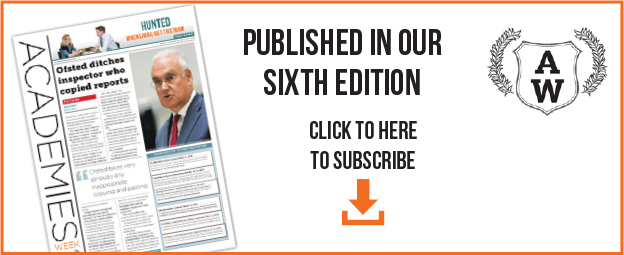
Edition five editorial
Gender salaries gap ‘widens’ in academies
In the office we were concerned to hear that the gap between men and women’s earnings in schools is widening.
Chris Keates, general secretary at the NASUWT raised the issue this week at an Education Select Committee, and we’ve published the latest official statistics (see page 5).
The difference is particularly acute in primary academies, with figures from last November showing female teachers earning on average 9 per cent less than men in those schools.
Next month the official salary count will take place again, and there are fears the gap may have widened further.
And how will the performance-related pay regime impact on gender equality?
As the DfE have rightly said: “Pay discrimination is unlawful and equal pay legislation applies to academies.”
So compliance is not an option or a freedom to ignore, it’s the law.

Edition four editorial
Having Schools Week reporters for nine days across the three main party conferences proved something of a resource and logistical challenge during our first four editions.
But it was worth it to share the fringe debates and key speech announcements (or lack of them) as they happened.
Highlights included Tristram Hunt talking of a ‘value neutral’ approach to school structures at the Labour party conference in Manchester, Nicky Morgan describing teachers as the school story ‘hero’ at the Conservative party conference in Birmingham and David Lawes not giving a speech so instead stalked by deputy editor Laura McInerney at the Liberal Democrat party conference in Glasgow.
Being out-and-about, or ‘on location’ as we call it, is an important way to hear from the school sector as well as be the first to tweet, blog and report on the news.
So if you have an event for us to report from then get in touch, and to hear from our reporters as they travel up and down the country follow @AWonlocation on twitter.
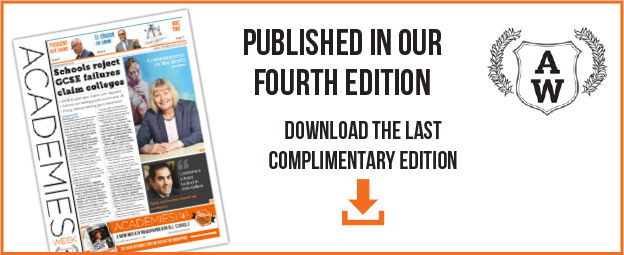
Edition three editorial
Exclusive: Free school ‘forced me out’ for not being top university ready
Nicky Morgan was keen to voice opposition to selective education at the Conservative Party Conference. And she’s right.
Yet on pages 6 and 7 a highly selective sixth form, praised in February by Michael Gove as a “superb new free school,” is exposed by Schools Week for dumping students halfway through their A-levels.
Why? Because, as the principal at the London Academy of Excellence (LAE) admits, if students don’t stand a strong chance of getting into a ‘competitive university’ he has decided they must retake their A-levels elsewhere.
Visit the LAE website and instead of an end of first year ‘forcing out’ policy for parents to ponder, you find press releases about their progression rates to Russell Group universities.
LAE should not be applauded for rigging their success.
The plaudits should go to the further education sixth form college next door.
Eddie Playfair at NewVic sixth form is supporting the ex-LAE students to retake their A-levels, and now doing so on less funding once they turn 18.
With the help of the local MP let’s hope LAE do the right thing for their students.
Edition two editorial
Childcare, qualified teachers, the forgotten 50% – Hunt’s policy pillars for 2015
The Labour Party conference will have proved a disappointment to anyone expecting schools policy to feature highly.
The Shadow Education Secretary Tristram Hunt used his speech to repeat well-rehearsed lines about childcare, the forgotten 50 per cent and wanting “world class teachers in every classroom”.
Sitting in the main hall listening to Tristram finish in the seventh minute, as all cabinet minister speech’s do, it certainly felt short on announcements and detail.
And within minutes of him coming off stage on the Sunday afternoon the rumour mill cranked into action.
Was there a last minute change of heart? Had Ed Balls over-ruled a spending commitment? Or, more likely, had the shiny new education announcement been saved for the leader’s speech two days later?
When Ed Miliband finally stood up at the end of the conference he remembered to announce not a school-based policy, but apprenticeships as the new shiny new education priority for 2015.
Labour not only wants the minimum duration doubled (to at least two years) and the difficulty level raised higher (from level two to at least level three) we also learnt for the first time that employers would be forced to recruit apprentices as part of procurement contracts.
For schools, then, it’s business as usual, as reaffirmed by Tristram in a series of fringe events (where time was less limited and detail, if not newness, was more forthcoming).
Good schools, whether free schools or academies would not be shut, in a commitment to a ‘value neutral’ approach to school structure.
This will have disappointed many, as will the lack of school related announcements.
But change fatigue seems to be a ‘thing’ (see Ofqual survey on page 10), so perhaps a period of stability is to be welcomed.
Edition one editorial
Exclusive: Secondary school opens ‘near empty’
A school opening story is perhaps not surprising given the time of year, but with 17 pupils Trinity Academy could find itself in the unenviable position of being the smallest ever mainstream secondary school.
Despite late decisions over the £18m site, many will point to the predictability of a ‘near empty’ school given the borough already had more than 200 surplus places.
But this misses the point as in the longer term a surplus might become a deficit and some allege that competition drives up education standards.
What’s important about this story is that the government decided to proceed with opening at all.
While under-recruitment at a new schools is not unheard of, hadn’t the DfE tightened up on allowing such inefficient funding agreements?
Clearly finding a site for the Trinity Academy proved a major challenge, and free school locations remains a hot topic.
It is then perhaps not surprising, although entirely coincidental, that Natalie Evans from the New School Network makes some sensible suggestions as to how the government purchase sites and school buildings in future.
Laura McInerney is the Editor of Schools Week


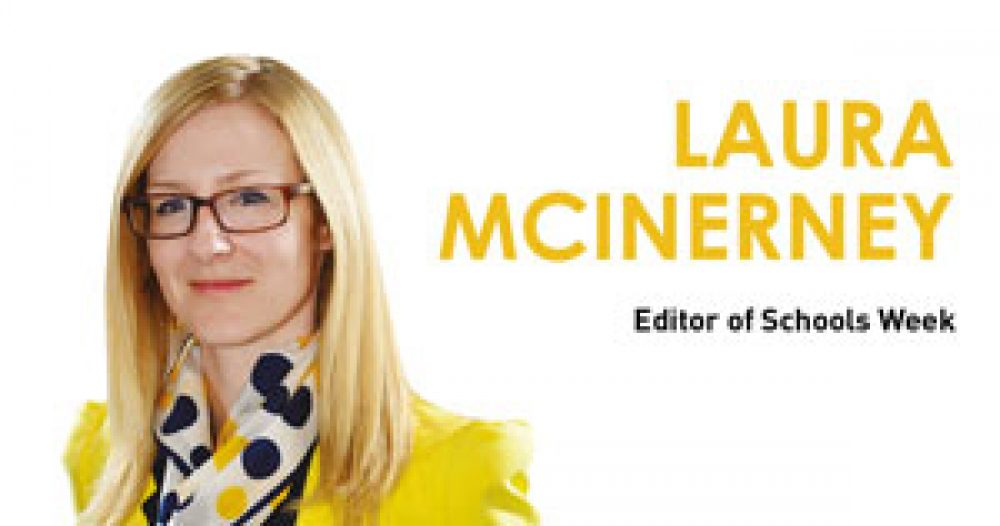
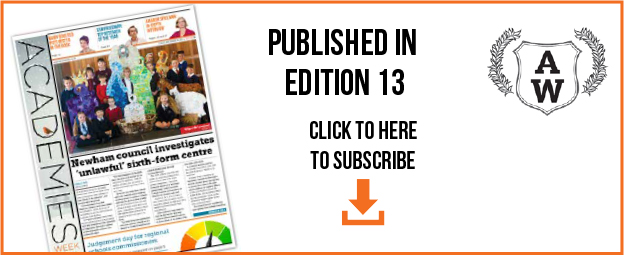
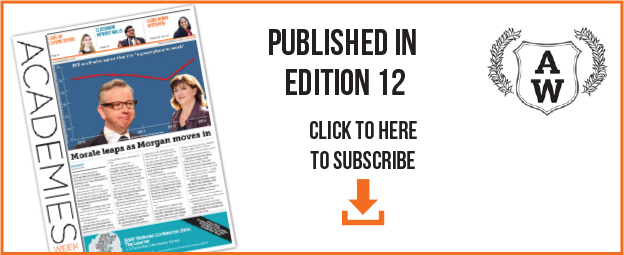
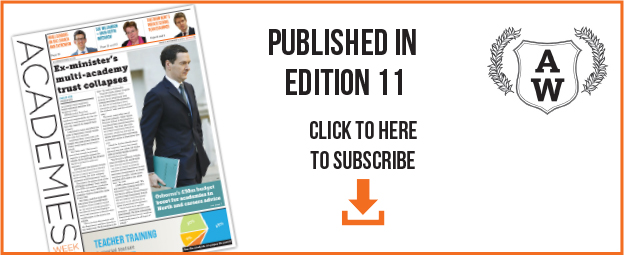
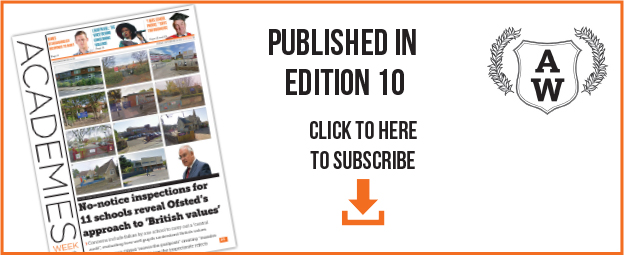
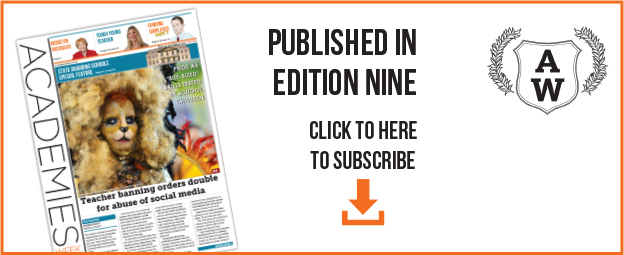

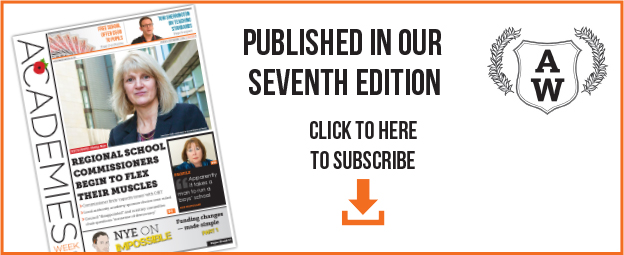
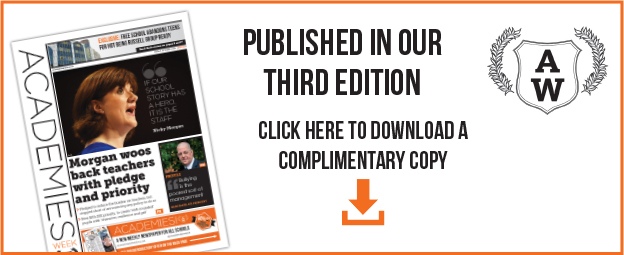
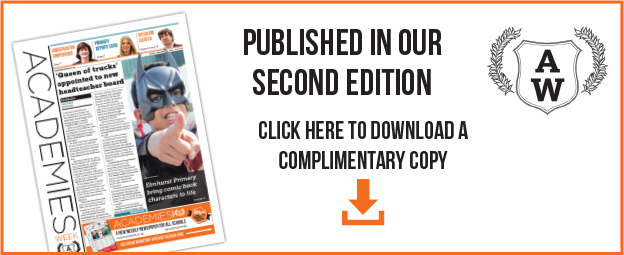
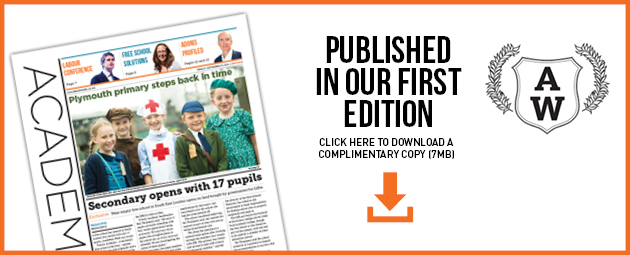





Your thoughts